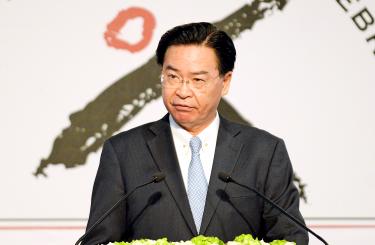Minister of Foreign Affairs Joseph Wu (吳釗燮) yesterday criticized China for lodging a protest against Japan’s Sankei Shimbun after it published an interview with him, saying that Beijing infringed on the press freedom of the two Asian democracies.
“It is astonishing that the authoritarian China not only cannot tolerate freedom of speech and of the press inside its borders, but it has also interfered with that enjoyed by the two most democratic Asian nations with the greatest press freedom,” Wu was quoted by Ministry of Foreign Affairs spokesman Andrew Lee (李憲章) as saying.
The incident proves that China poses a threat to the global values of freedom and democracy, Wu said, calling on like-minded nations to work together to prevent the trend from spreading.
China’s protest also shows that “we have done something right,” Wu added.
In the interview published on Wednesday, Wu called for Taiwan and Japan to initiate a security dialogue on the grounds that ensuring security is a shared responsibility of the two nations.
Wu also criticized China for limiting the room for interpretation of its “one China” principle, which he said cannot be accepted by Taiwanese.
After the US severed diplomatic ties with Taiwan in 1979, it enacted the Taiwan Relations Act that laid down a legal foundation for a security dialogue between Washington and Taipei, the report said.
However, there is no legal foundation for exchanges between Japan and Taiwan after they broke off relations in 1972, it added.
The Chinese embassy in Japan lodged a stern protest against the Sankei Shimbun, saying that Taiwan is a part of China and that the article included portions that advocated Taiwanese independence.
When the newspaper opened a branch office in China, it pledged to abide by the “one China” principle in its reporting, a consensus that the paper had contravened, the embassy said.
“In the process of the normalization of China-Japan relations, we hope to see the Sankei Shimbun publish reports that are conducive to the establishment of mutual understanding between the Japanese and Chinese people,” the embassy said.
Relations between Taiwan and Japan are handled by two non-governmental agencies, the Taiwan-Japan Relations Association and the Japan-Taiwan Exchange Association, which last year changed their names to better reflect their functions.
The Taiwan-Japan Relations Association was previously called the Association of East Asian Relations, while the Japan-Taiwan Exchange Association was previously called the Interchange Association, Japan.
Source: Taipei Times - 2018/06/29





















